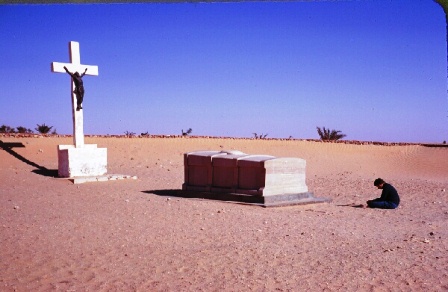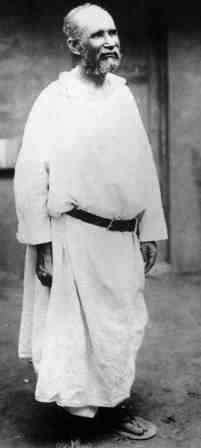You must cross the desert and dwell in it to receive the grace of God. It is here that one drives out everything that is not God. The soul needs to enter into this silence, this recollection, this forgetfulness of all created things by which God establishes his rule in it and forms within it the life of the spirit, the life of intimacy with God, the conversation of the soul with God in faith, hope and charity.
 The above quotation is an extract of a letter written by Charles de Foucauld to a Trappist monk who was preparing for his ordination. In this letter Charles is writing from his own experiences of a modern desert dweller as the way to experience the very presence of God.
The above quotation is an extract of a letter written by Charles de Foucauld to a Trappist monk who was preparing for his ordination. In this letter Charles is writing from his own experiences of a modern desert dweller as the way to experience the very presence of God.
 I first came to know of this wonderful hermit through his abandonment prayer, a prayer, I am sure has been said by many since his death. Modelled on our Lord’s own abandonment prayer in the Garden of Gethesemane, it is utter giving of self and will to God to do what He will. Here it is:
I first came to know of this wonderful hermit through his abandonment prayer, a prayer, I am sure has been said by many since his death. Modelled on our Lord’s own abandonment prayer in the Garden of Gethesemane, it is utter giving of self and will to God to do what He will. Here it is:

 Father, I abandon myself into your hands; do with me what you will. Whatever you may do, I thank you. I am ready for all, I accept all. Let only your will be done in me, and all your creatures – I wish no more than this, O Lord. Into your hands I commend my soul; I offer it to you with all the love of my heart, for I love you, Lord, and so need to give myself, to surrender myself into your hands, without reserve, and with boundless confidence, for you are my Father. Amen.
Father, I abandon myself into your hands; do with me what you will. Whatever you may do, I thank you. I am ready for all, I accept all. Let only your will be done in me, and all your creatures – I wish no more than this, O Lord. Into your hands I commend my soul; I offer it to you with all the love of my heart, for I love you, Lord, and so need to give myself, to surrender myself into your hands, without reserve, and with boundless confidence, for you are my Father. Amen.
 It is indeed a very dangerous prayer to pray with all the heart and soul as it means forfeiting any desire to direct our lives.
It is indeed a very dangerous prayer to pray with all the heart and soul as it means forfeiting any desire to direct our lives.
 But it was not always so with Brother Charles. Any faith he had as a child left him quickly and even perhaps self- discipline as he only scraped through his final examination at the military academy at Saumur. As a cavalry officer he continued his dissolute life even when his regiment was sent to Morocco. He came to be enchanted with this area, and with a Jewish Rabbi he travelled throughout Morocco for a year during which he mapped thousands of miles and wrote lyrically of the desert. That was a turning point in his life.
But it was not always so with Brother Charles. Any faith he had as a child left him quickly and even perhaps self- discipline as he only scraped through his final examination at the military academy at Saumur. As a cavalry officer he continued his dissolute life even when his regiment was sent to Morocco. He came to be enchanted with this area, and with a Jewish Rabbi he travelled throughout Morocco for a year during which he mapped thousands of miles and wrote lyrically of the desert. That was a turning point in his life.
 His reintroduction to the Faith came on his return to Paris. He started to drop into churches to pray, one of which was St. Augustine. Here he met an extraordinary curé, Abbé Huvelin who persuaded him to make his confession, and to go on pilgrimage to the Holy Land. That trip was another turning point in his life. Desiring a more austere life he became the gardener for the Poor Clares in Nazareth in 1897. In their chapel he spent hours praying before the Blessed Sacrament. He returned to France with a deep desire to spend silent prayer in adoration to God. He entered the Cistercian monastery of our Lady the Snows, and shortly afterwards to Staoueli, near Algiers. But he longed for a stricter life of poverty and simplicity. Wisely his superior released him from his vows.
His reintroduction to the Faith came on his return to Paris. He started to drop into churches to pray, one of which was St. Augustine. Here he met an extraordinary curé, Abbé Huvelin who persuaded him to make his confession, and to go on pilgrimage to the Holy Land. That trip was another turning point in his life. Desiring a more austere life he became the gardener for the Poor Clares in Nazareth in 1897. In their chapel he spent hours praying before the Blessed Sacrament. He returned to France with a deep desire to spend silent prayer in adoration to God. He entered the Cistercian monastery of our Lady the Snows, and shortly afterwards to Staoueli, near Algiers. But he longed for a stricter life of poverty and simplicity. Wisely his superior released him from his vows.
 A pilgrim once again, he returned to Nazareth where he became “a jack of all trades” for the Poor Clares. Here he spent many hours in their chapel praying before the Blessed Sacrament, and he underwent a profound conversion, the vital turning point in his life. He returned to France and at the turn of the century was ordained before returning to the desert at Beni Abbés. Here he worked to free slaves and to encourage French soldiers to return to their faith and attendance at Mass.
A pilgrim once again, he returned to Nazareth where he became “a jack of all trades” for the Poor Clares. Here he spent many hours in their chapel praying before the Blessed Sacrament, and he underwent a profound conversion, the vital turning point in his life. He returned to France and at the turn of the century was ordained before returning to the desert at Beni Abbés. Here he worked to free slaves and to encourage French soldiers to return to their faith and attendance at Mass.
 Soon he ventured further south in the Sahara making Tamanrasset his base amongst the Tuareg people, who looked upon him as their doctor and later as friend. His great love for His Master drove him deeper into the wilderness to Asekrem. Here he finished his Tamahaqq Grammar and Dictionary, and his collection of Tuareg poems and proverbs. Before his unprepared death on 1st December, 1916, a victim of local religious wars, he had striven to form brotherhoods and sisterhoods for which he had written Rules.
Soon he ventured further south in the Sahara making Tamanrasset his base amongst the Tuareg people, who looked upon him as their doctor and later as friend. His great love for His Master drove him deeper into the wilderness to Asekrem. Here he finished his Tamahaqq Grammar and Dictionary, and his collection of Tuareg poems and proverbs. Before his unprepared death on 1st December, 1916, a victim of local religious wars, he had striven to form brotherhoods and sisterhoods for which he had written Rules.
 Unlike those in the very early church who ventured to the desert for solitude and solace Bro. Charles kept in contact with the world. One way was through his correspondence. Through his letters, his own writings and the prayers and meditations he composed we learn much about “the absolute” in the soul’s encounter with the Divine. That life manifested that the only true path to perfection is a life of complete abandonment to the Father to work through us.
Unlike those in the very early church who ventured to the desert for solitude and solace Bro. Charles kept in contact with the world. One way was through his correspondence. Through his letters, his own writings and the prayers and meditations he composed we learn much about “the absolute” in the soul’s encounter with the Divine. That life manifested that the only true path to perfection is a life of complete abandonment to the Father to work through us.
 Some years after his death in 1933 the Little Sisters of the Sacred Heart was founded based on the Rules he had composed for Sisters, whilst twelve years later in 1945 the Little Brothers of Jesus came into being based on his Rule for brothers. He has now been beautified.
Some years after his death in 1933 the Little Sisters of the Sacred Heart was founded based on the Rules he had composed for Sisters, whilst twelve years later in 1945 the Little Brothers of Jesus came into being based on his Rule for brothers. He has now been beautified.
BLESSED CHARLES DE FOUCAULD - DESERT MARTYR OF THE EARLY TWENTIETH CENTURY

